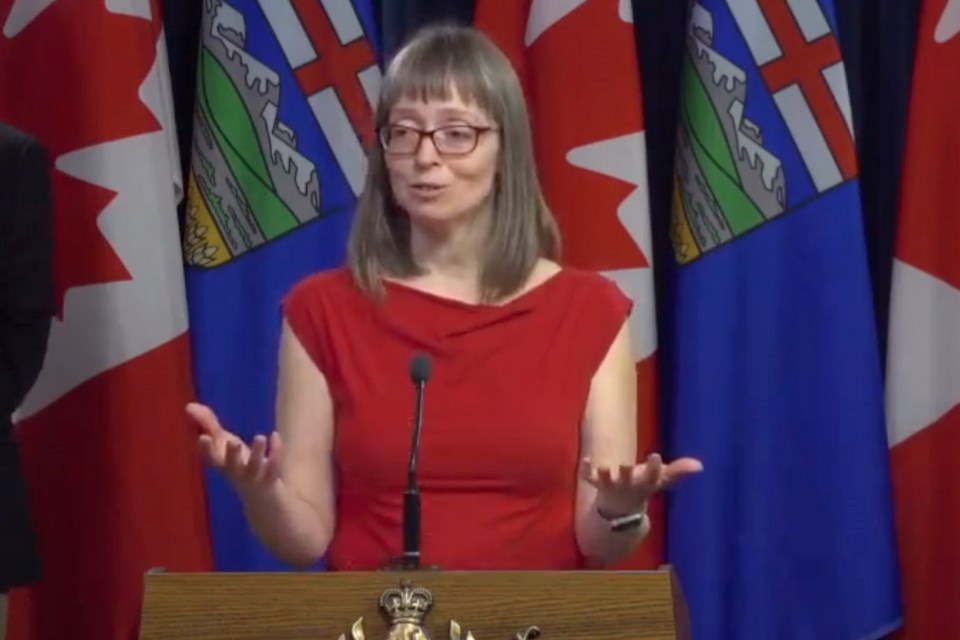Forty-two more Albertans have been diagnosed with COVID-19 since Sunday, with some 301 Albertans confirmed to have the virus. Twenty-four cases are suspected to have resulted from community transmission.
On Monday afternoon, Alberta Chief Medical Officer of Health Dr. Deena Hinshaw said there are 18 people in hospital with seven people in the ICU.
There have been no additional deaths since one person died last week, and three Albertans are reported to have recovered from COVID-19 so far.
Also, Hinshaw said an investigation has determined that 11 of the 47 Alberta health-care workers who attended a bonspiel in Edmonton between March 11 and 14 tested positive for the coronavirus. Many of them are physicians who worked early last week and treated patients before notification came through of the case associated with the event. Dr. Hinshaw said all contacts are being notified as per usual local public health followup.
The province has run 29,757 tests to date and Hinshaw said they will likely have the long-term capacity to run around 3,000 tests per day.
Hinshaw said the most important thing a person can do if they have minor symptoms is to stay home.
Hinshaw said the province has updated the self-isolation timeline for those who are sick. Anyone who is sick is being asked now to self-isolate for 10 days from the onset of symptoms, rather than the previous 14 days.
"The most up-to-date medical evidence indicates that if you are feeling well after 10 days from the onset of mild symptoms like sore throat, runny nose or cough, you will be able to stop self isolating providing your symptoms have resolved. If symptoms continue after 10 days, self isolation should as well."
This 10-day timeline is for those who are sick.
For those who are well and have been exposed, they must still isolate for 14 days.
"For those who are well and are returning from outside of Canada or have had close contact with a confirmed case, they will still need to self-isolate for 14 days upon their return or from their last exposure as a precaution," Hinshaw said.
If they start to experience symptoms, they need to start to observe the 10-day rule, so that means tacking on 10 days from the moment of the onset of mild symptoms.
On Monday morning, Alberta announced it will be taking a new approach to testing for COVID-19 that is going to prioritize groups at highest risk of local exposure and at-risk populations.
Travellers who returned to Alberta after March 12 and are showing mild symptoms will not longer be tested. The province asks anyone who is sick to self-isolate at home and stay away from others.
This change is effective going forward, so anyone who has already been told by Health Link that they will be tested will still get tested.
Hinshaw said this will allow the province to focus its testing capacity on those most at risk.
Anyone who has minor symptoms will not be tested and is asked to stay home but they will continue testing anyone who is admitted to the hospital for respiratory illnesses or anyone in continuing care or other similar facilities.
"For these individuals, COVID-19 remains a dangerous illness."
Later this week, testing will also be available for healthcare workers. Hinshaw said this is so medical professionals can return to the front line as soon as possible.
"It also helps us to test some individuals who have not travelled so we have a better understanding of where there may be spread in our communities."
Hinshaw said people with mild symptoms who do not meet the new criteria will not be tested, although they will honour any existing appointments that have already been made.
"The number one thing you can do if you have mild symptoms isn't to get tested. It is to stay home and self isolate away from others," Hinshaw said.
But Hinshaw said she knows this may be tough for some Albertans to not have access to the test.
"I understand some Albertans may be upset with this change. I can appreciate the comfort and certainty that testing can bring for people who are unsure if they have a minor bug or COVID-19," Hinshaw said.
Hinshaw said it's important to remember that the majority of people who get COVID-19 will experience minor symptoms.
All doctors and healthcare workers will be screened before they start their shifts and anyone with symptoms such as a high temperature or signs of illness will be sent home and will be told to self-isolate.
AHS is also implementing a process to expedite a return to work process for healthcare workers who are self-isolating but are displaying no symptoms.
"This will only be done in exceptional and limited circumstances where it is absolutely necessary for that front line care worker to work and there are no alternatives for coverage," Hinshaw said.
Overall Hinshaw said the new testing regime won't result in fewer tests being done.



